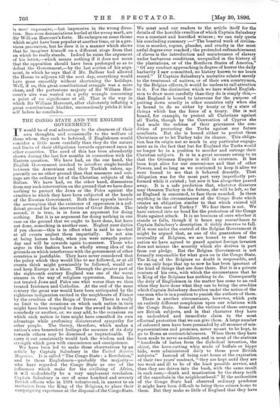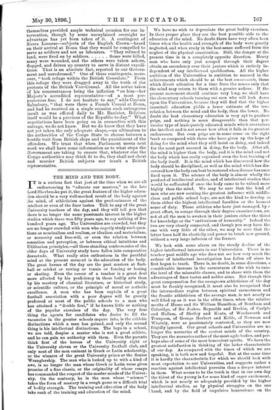THE CONGO STATE AND THE ENGLISH GOVERNMENT.
IT would be of real advantage to the clearness of their own thoughts, and occasionally to the welfare of those whom they seek to befriend, if Englishmen would consider a little more carefully than they do the nature and limits of their obligations towards oppressed races in other countries. The need of this has been abundantly shown during the last few months in connection with the Eastern question. We have had, on the one hand, the English Government invoked to interfere single-handed between the Armenians and their Turkish rulers, ap- parently on no other ground than that massacre and out- rage are the ordinary lot of the Christian subjects of the Sultan. We have had, on the other hand, dissuasives from any such intervention on the ground that we have done nothing to protect the Jews or the Poles against the cruelties to which they have been subjected at the hands of the Russian Government. Both these appeals involve the assumption that the existence of oppression is a suf- ficient ground for the intervention of Great Britain. The second, it is true, is in form an argument for doing nothing. But it is an argument for doing nothing in one case on the ground that we ought to have done, but have not done, something in another case. Neglect your duties if you choose—this is in effect what is said to us—but at all events neglect them impartially. Do not aim at being heroes to-day, when you were cowards yester- day and will be cowards again to-morrow. Those who argue in this fashion have a wholly wrong idea of the grounds on which interference with the government of other countries is justifiable. They have never considered that the policy which they would like to see followed, or at all events think might permissibly be followed, would set and keep Europe in a blaze. Through the greater part of the eighteenth century England was one of the worst sinners in the way of religious oppression. Russia has not treated Jews and Poles one whit worse than we then treated Irishmen and Catholics. At the end of the same century the great war would have been anticipated by the righteous indignation excited in the neighbours of France by the cruelties of the Reign of Terror. There is really no limit to the occasions on which each nation in turn might have been tempted to draw the sword in defence of somebody or another, or, we may add, to the occasions on which each nation in turn might have consulted its own advantage while professing disinterested sympathy for other people. The theory, therefore, which makes a nation's own benevolent feelings the measure of its duty towards others may be dismissed as impracticable. To carry it out consistently would task the wisdom and the strength which goes with omniscience and omnipotence.
We have been led to make these observations by an aitiele by Captain Sainsbury in the United Service Magazine. It is called "The Congo State : a Revelation," and to those Englishmen—probably the majority— who have regarded the Congo State as one of the influences which make for the civilising of Africa, it w;11 undoubtedly be a very unpleasant revelation. Captain Salusbury is one of some hundred and seventy British officers who in 1894 volunteered, in answer to an invitation from the King of the Belgians, to place their campaigning experience at the disposal of the Congo State. We must send our readers to the article itself for the details of the horrible cruelties of which Captain Salusbury was a constant and horrified witness ; we can only quote his concluding summary :—" The boasted work of civilise, tion is murder, rapine, plunder, and cruelty in the most awful degree ever reached ; the pretended enfranchisement of slaves is the introduction and maintenance of slavery under barbarous conditions, unequalled in the history of the plantations, or of the Southern States of America." "Of any conduct approaching in degree of horror the daily barbarity I saw committed, no history known to me bears record." If Captain Salusbury's narrative related merely to the treatment of natives, or of their own countrymen, by the Belgian officers, it would be useless to call attention to it. For the distinction which we have wished English- men to draw more carefully than they do is simply this,— that England is bound to intervene for the purpose of putting down cruelty in other countries only when she is bound to do so either by treaty or by a state of things which has the force of a treaty. She is not bound, for example, to protect all Christians against all Turks, though by the Convention of Cyprus she had made the redress of their grievances the con- dition of protecting the Turks against any future assailants. But she is bound either to protect these Christians or to let Turkey take its chance. This obliga- tion has its origin not so much in any particular engage- ment as in the fact that but for England the Turks would no longer be in a position to murder and outrage their Christian subjects. It is in a great measure owing to us that the Ottoman Empire is still in existence. It has been kept alive for our convenience and that of other Powers, and so long as we continued to keep it alive we were bound to see that it behaved decently. That obligation was for the most part very imperfectly per- formed while it existed ; but now it has altogether passed away. It is a safe prediction that, whatever disasters may threaten Turkey in the future, she will be left, so far as England is concerned, to face them unaided. Is there anything in the circumstances of the Congo State which creates an obligation similar to that which existed till lately in the case of Turkey ? We fear there is not. We have entered into no bond for the protection of the Congo State against attack. It is no business of ours whether it stands or falls, though if it bears any resemblance to Captain Salusbury's description it richly deserves to fall. If it were under the control of the Belgian Government it might be argued that, as one of the guarantors of the neutrality of Belgium, we are bound to see that the nation we have agreed to guard against foreign invasion does not misuse tke security which she derives in part from our pledge. But the Belgian Government is not formally responsible for what goes on in the Congo State. The King of the Belgians no doubt is responsible, and we can only hope that up to now he has been ignorant of the kind of things that are done there. But it is a private venture of his own, with which the circumstance that he is King of the Belgians has nothing to do. Consequently the duty of Englishmen in the matter has come to an end when they have done what they can to bring the cruelties which Captain Salusbury describes under the notice of the one man who is in a position to punish the authors of them. There is another circumstance, however, which puts an entirely different complexion upon our relations with the Congo State. Some of the victims of these outrages are British subjects, and in that character they have an undoubted and immediate claim to the most effectual protection that we can give them. A large number of coloured men have been persuaded by all manner of mis- representations and promises, never meant to be kept, to go to Boma as contract-labourers. When there they have been made to serve as soldiers, and in most of the stations "hundreds of lashes from the diabolical invention, the chicot, the keen-cutting whip made of buffalo or hippo hide, were administered daily to these poor British subjects." Instead of being sent home at the expiration of their two years' contract, "they are kept until they are too weak and ill to be of the least possible service, and then they are driven into the bush, with the same result in each case,--death and mastication by the sharp teeth of the cannibals in the neighbourhood." If the authorities of the Congo State had observed ordinary prudence it might have been difficult to bring these crimes home to them. But they make so little of England that they have themselves provided ample technical occasion for our in- tervention, though by some unexplained oversight no advantage has yet been taken of it. A contingent of Sierra Leonese—subjects of the English Crown—heard on their arrival at Boma that they would be compelled to serve as soldiers and not as labourers. "They refused to land, were fired on by soldiers Some were killed, many were wounded, and the others were taken ashore, flogged, and driven up country to serve in distant expedi- tions. That is an absolute fact, reported to our Govern- ment and unredressed." One of these contingents, more- over, "took refuge within the British Consulate." From this refuge they were dragged away in the teeth of the protests of the British Vice-ConsuL All the notice taken of his remonstrances being the infliction "on him—her Majesty's accredited representative—of a most pre- posterous fine. I do not hesitate to say," adds Captain Sainsbury, "that were there a French Consul at Boma, and had he received on a single occasion such outrageous insult as was offered daily to Mr. Banister, Belgium itself would be a province of the Republic to-day." What negotiations have been going on in connection with this outrage, we do not know. But we do know that they have not yet taken the only adequate shape,—an ultimatum to the authorities of the Congo State to choose between a hostile visit from British ships and the punishment of the offenders. We trust that when Parliament meets next week we shall have some information as to what steps the Government are taking to ensure that, whatever else the Congo authorities may think fit to do, they shall not cheat and murder British subjects nor insult a British representative.



































 Previous page
Previous page